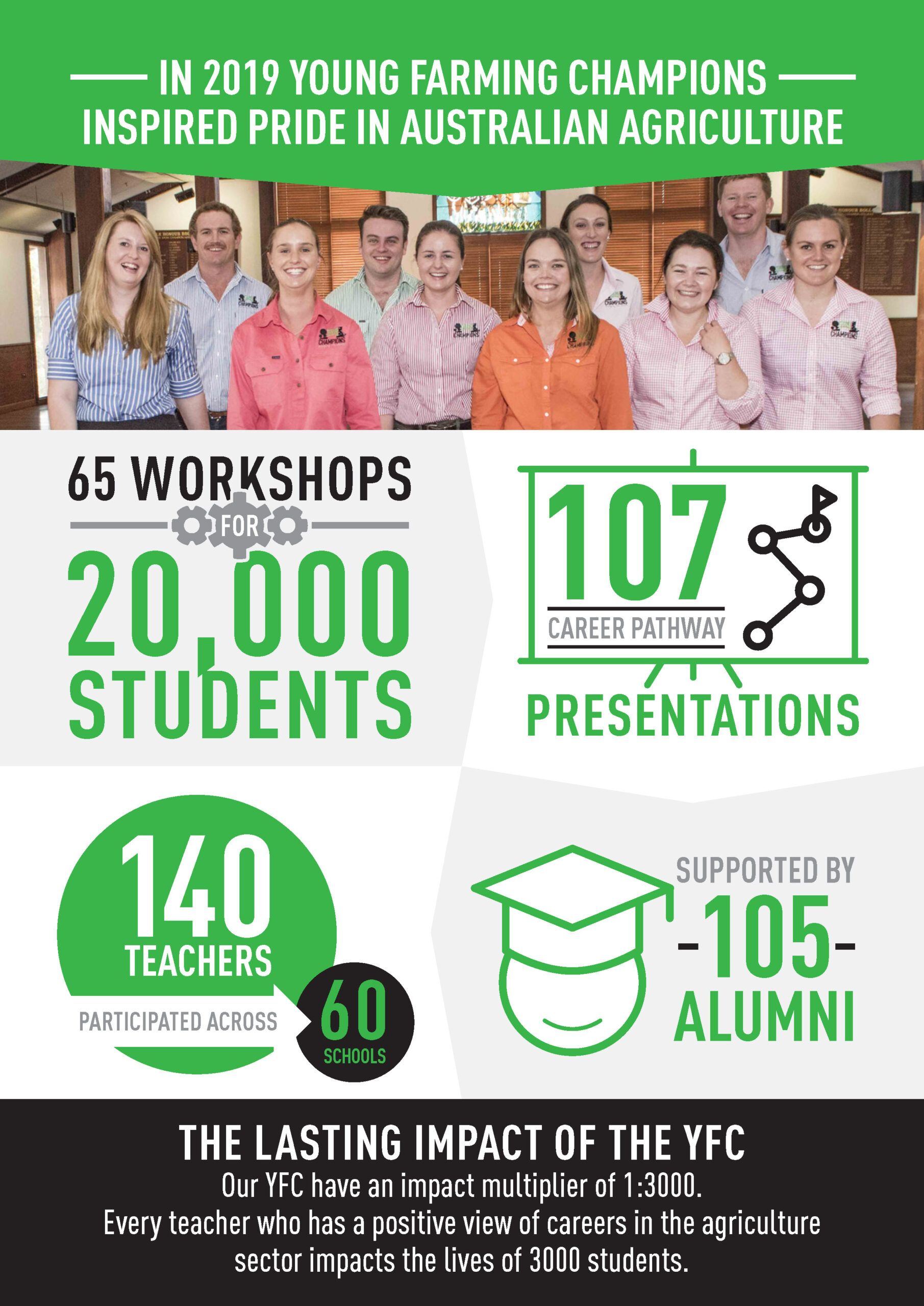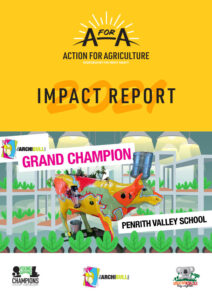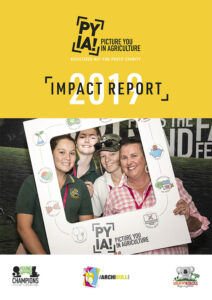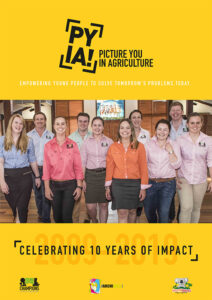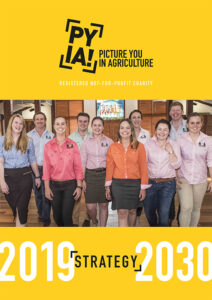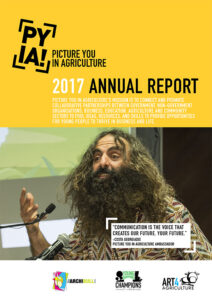United Nation’s Sustainable Development Goals
Action for Agriculture activities in Australia play a key and unique role in delivering on a number of the United Nation’s Sustainable Development Goals which are aimed at ensuring the best possible world for all beings on earth. Action for Agriculture’s operations are strongly aligned to the following goals.
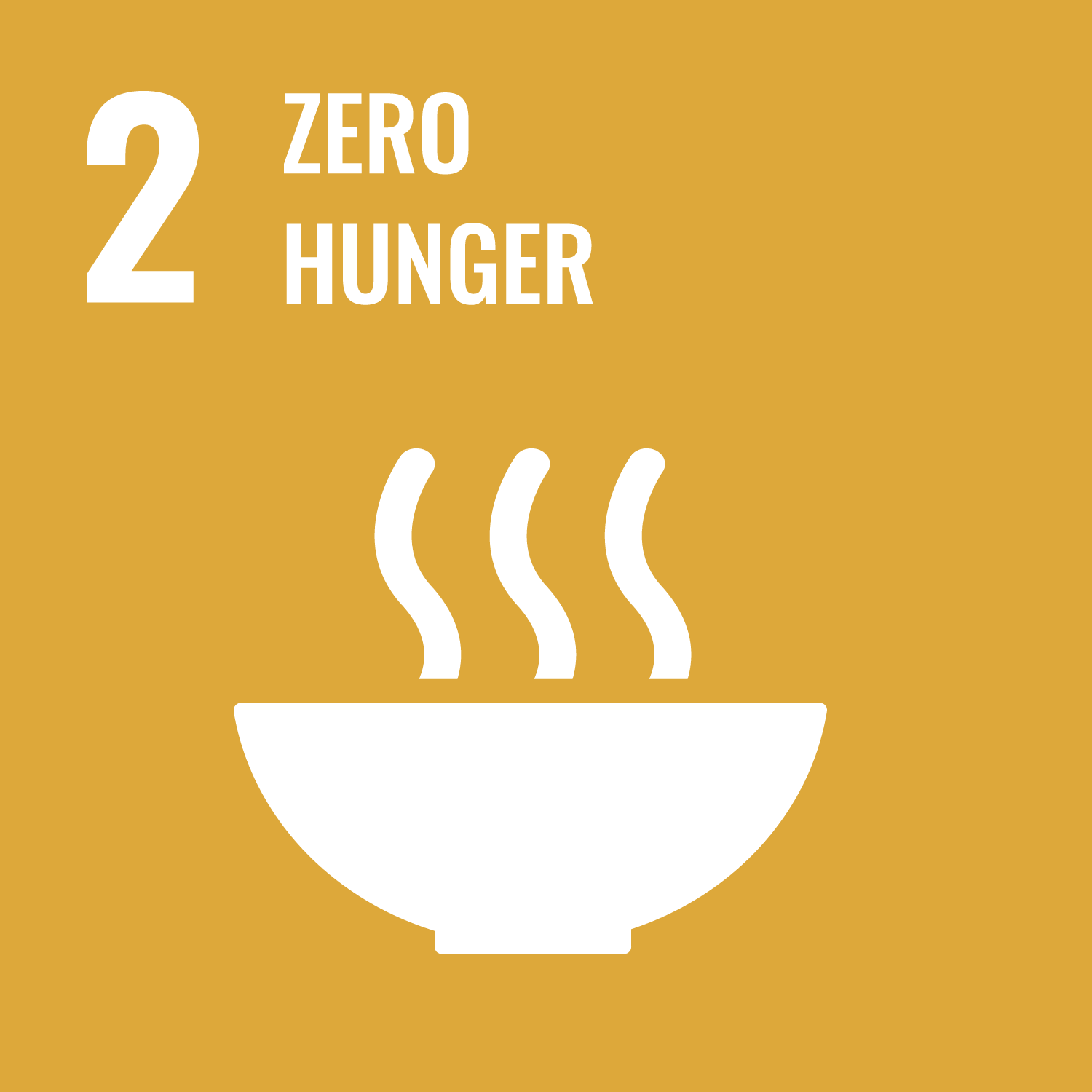
Zero Hunger
Action for Agriculture has partnered with OzHarvest FEAST to inspire kids to eat healthy, waste less and become change-makers in their local community. When you hear the following facts, like us, you will see this mission is a national priority:
- One child in every classroom goes to bed or school hungry every day
- Nationally, 1 in 4 children are overweight or obese and many do not eat enough fresh fruit and veg, which affects how they learn at school and can lead to poor physical and mental health.
- One third of all food wasted comes from the home. So, we can all be part of the solution, starting TODAY!
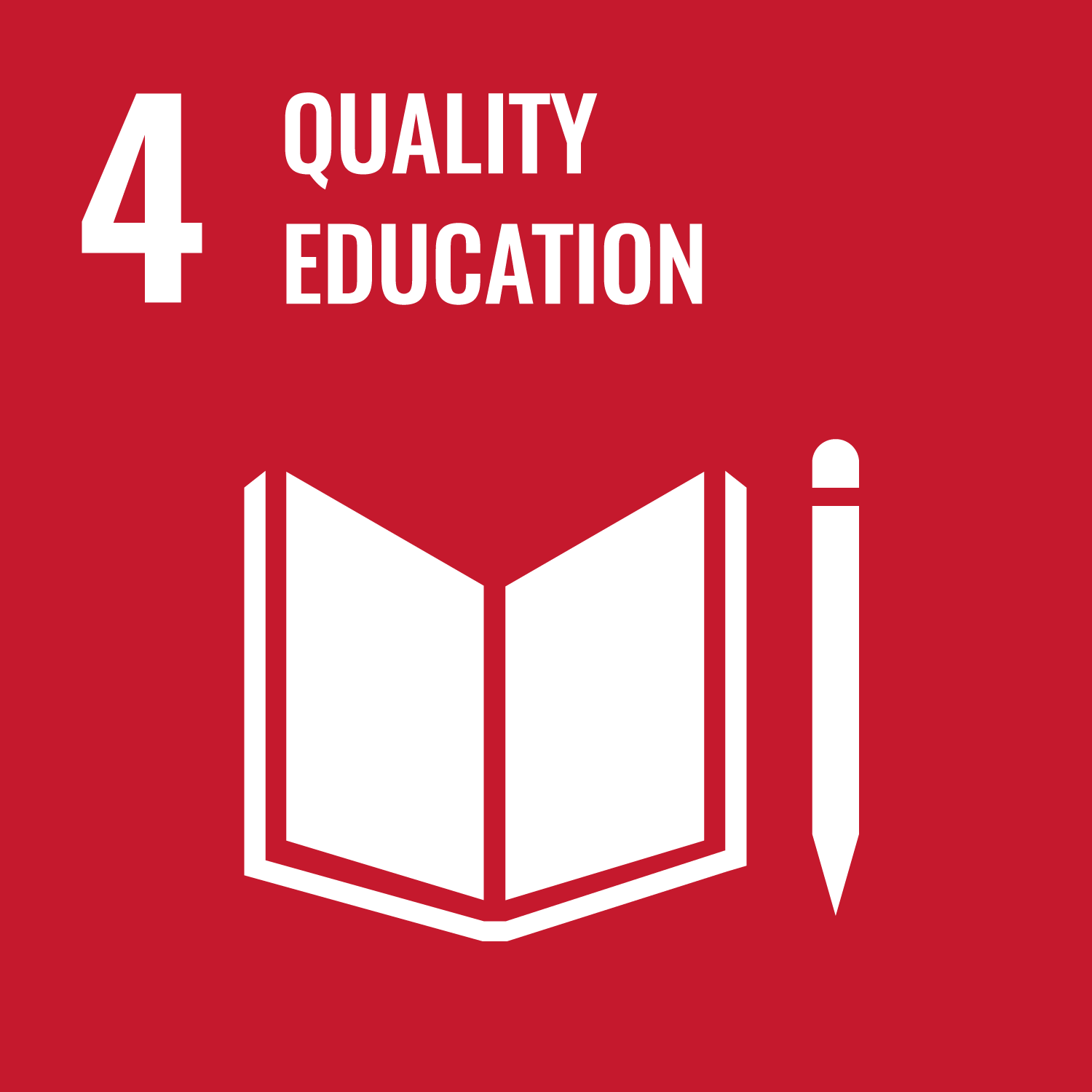
Quality Education
Action for Agriculture has empowered more than 300,000 students with 21st Century skills including communication, teamwork, creativity, problem solving while providing equal access to all genders and indigenous peoples in the school community.
Relevant Targets [UNSDG 4.4, 4.5]
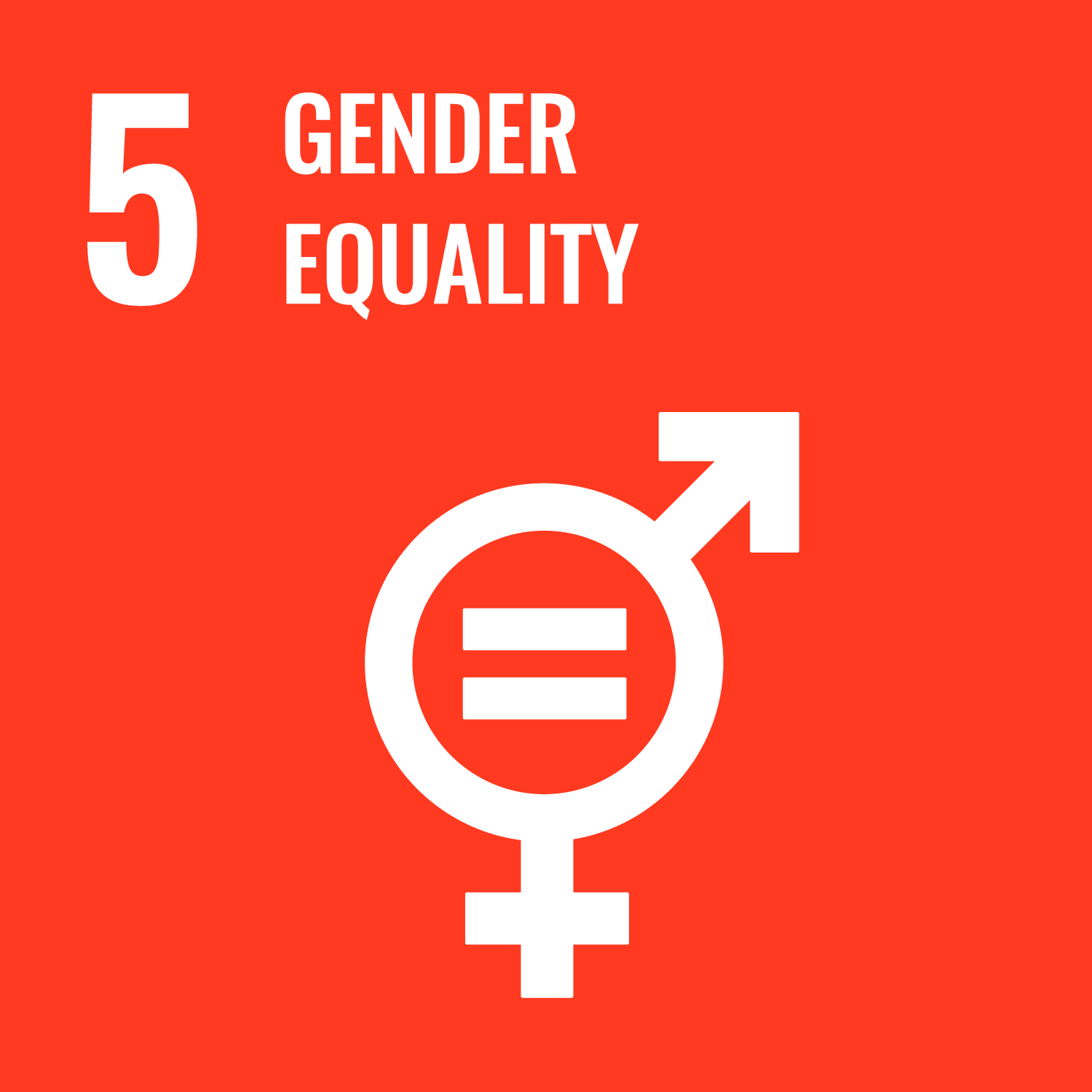
Gender Equality
By providing opportunities for female leadership in the Young Farming Champions program, as well as the Youth Voices Leadership Team, we are ensuring full and effective participation for women. We utilise the power of storytelling through communication technologies to support these leaders to share their successes and inspire the next generation.
Relevant Targets [UNSDG 5.5, 5.B]
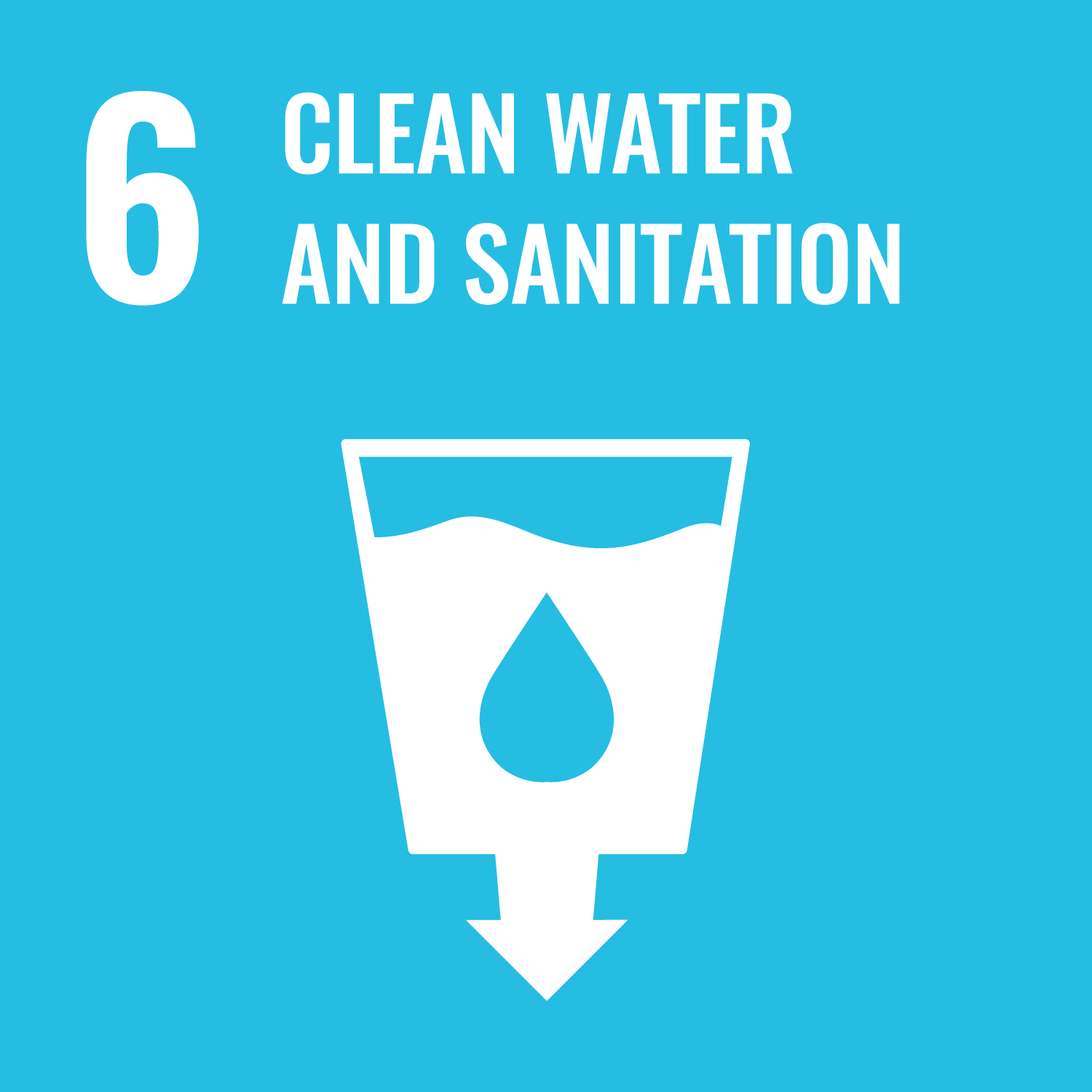
Clean Water and Sanitation
Success in agriculture hinges on many factors, but farmers worldwide have perhaps one common fear: lack of water. And for good reason. According to the Food and Agriculture Organization (FAO), agriculture uses about 70 percent of the world’s fresh water and shortage will have a huge impact on food security. Students are encouraged to explore water usage as a research topic in both Kreative Koalas and The Archibull Prize.
Relevant Targets [UNSDG 6.3, 6.4, 6.B]
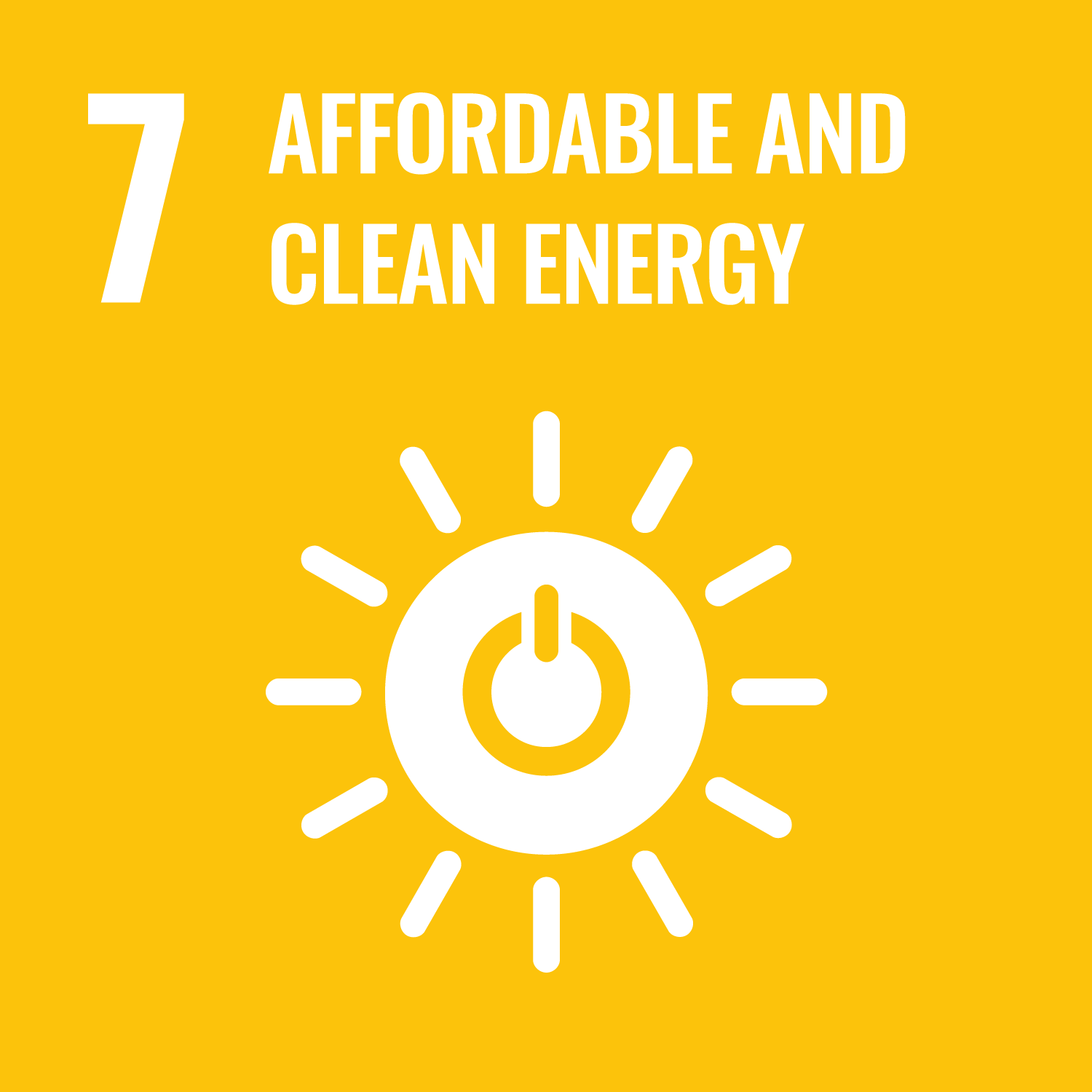
Affordable and Clean Energy
Students in The Archibull Prize and Kreative Koalas elect Renewable Energy as a research topic and as explicit based learning. Our Community Champions and Young Farming Champions help further their knowledge by sharing subject matter expertise to explore how school students can utilize sustainable energy resources in their local community.
Relevant Targets [UNSDG 7.2]
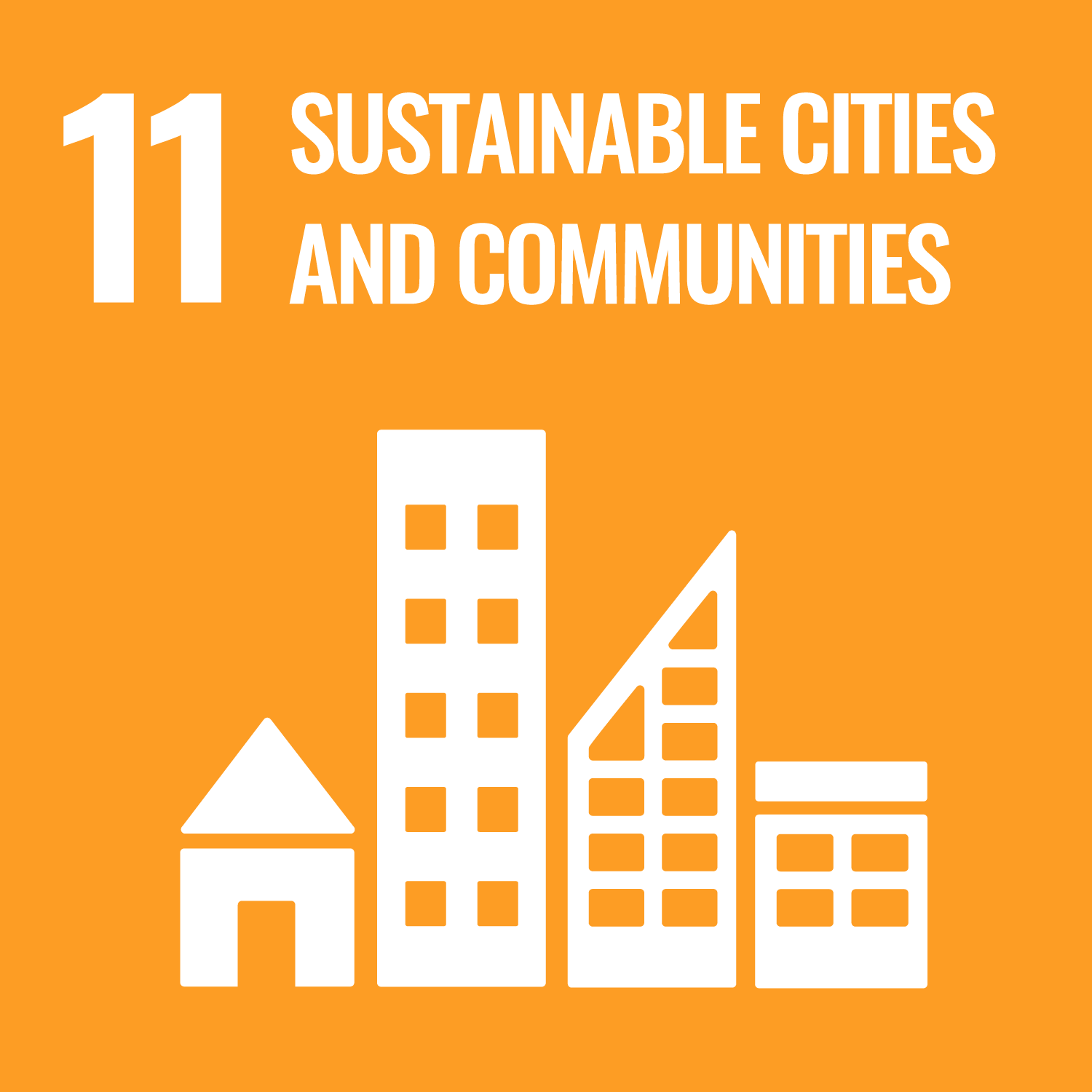
Sustainable Cities and Communities
Through Kreative Koalas and The Archibull Prize students take a hands-on approach to imagining our future healthy cities and communities with a focus on waste management starting with researching the state of rubbish in their school, creating potential solutions and building a project that can be useful for the community to reduce, reuse and recycle waste. Educating children in school has flow on effects to behaviour at home also educating parents about recycling practices.
Relevant Targets [UNSDG 11.6, 11.7]
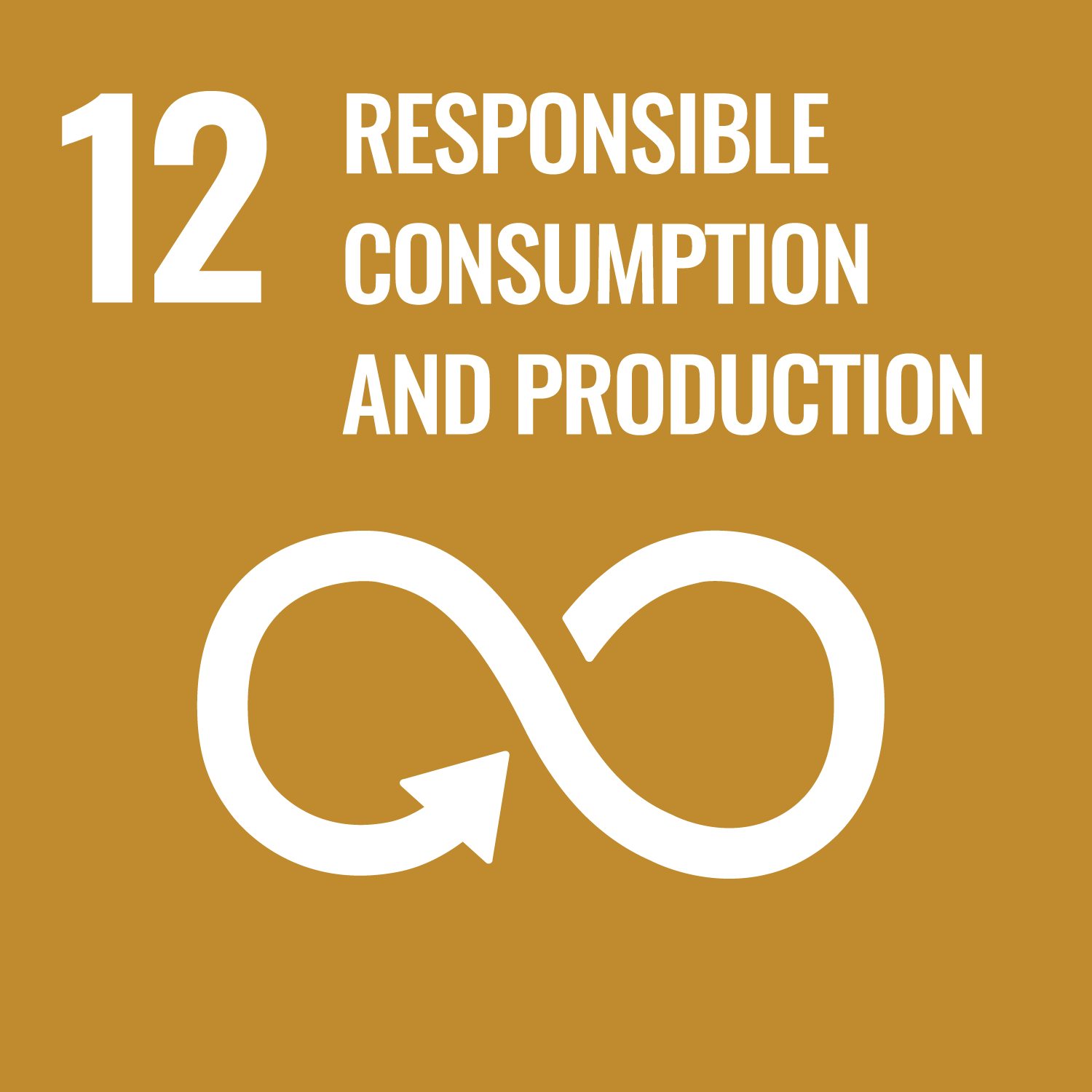
Responsible Consumption and Production
Food waste is a major issue in Australia. Through both Kreative Koalas and The Archibull Prize, students learn how supply chains work as they engage with the ‘paddock to plate’ process. Young Farming Champions share firsthand experiences about growing up and working on the land with students to bring agriculture to life speaking about the importance of clean air and water, healthy soils, biodiversity and biosecurity. Students can also choose ‘Waste’ or ‘Food Security’ as a student research topic.
Relevant Targets [UNSDG 12.3, 12.4, 12.5, 12.8]
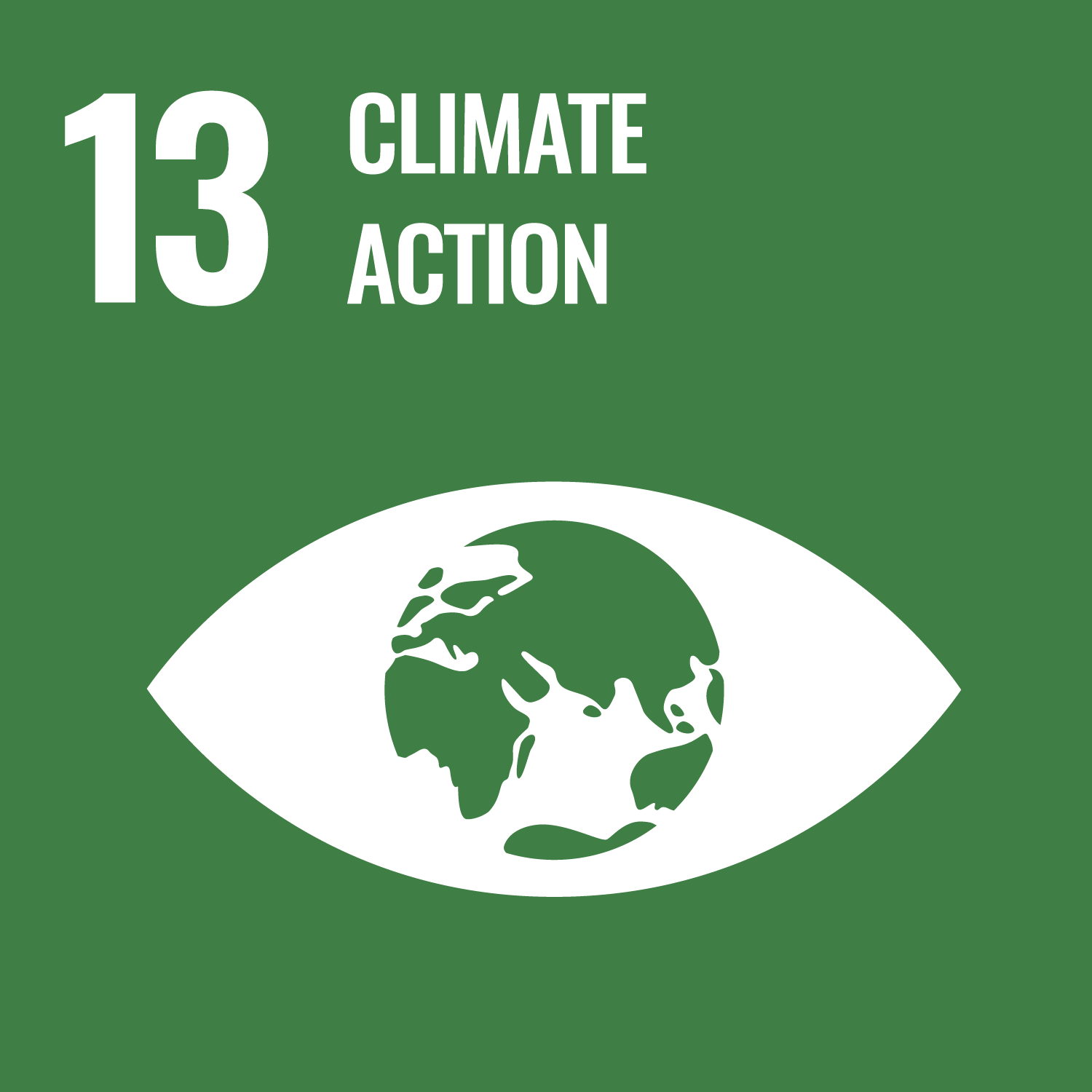
Climate Action
Climate action is a top priority for the current generation in schools. With unprecedented awareness of the challenges ahead of them, Action for Agriculture is uniquely positioned to provide expertise to students. A hands-on approach is provided by choosing ‘Climate Action’ as one of The Archibull Prize or Kreative Koalas student research topics to explore with their team. Our Young Farming Champions are improving national awareness by speaking about climate challenges on stages across the country including at TEDx events, Rotary and Teacher Conferences, state-wide Young Achiever Award ceremonies and more.
Relevant Targets [UNSDG 13.3]
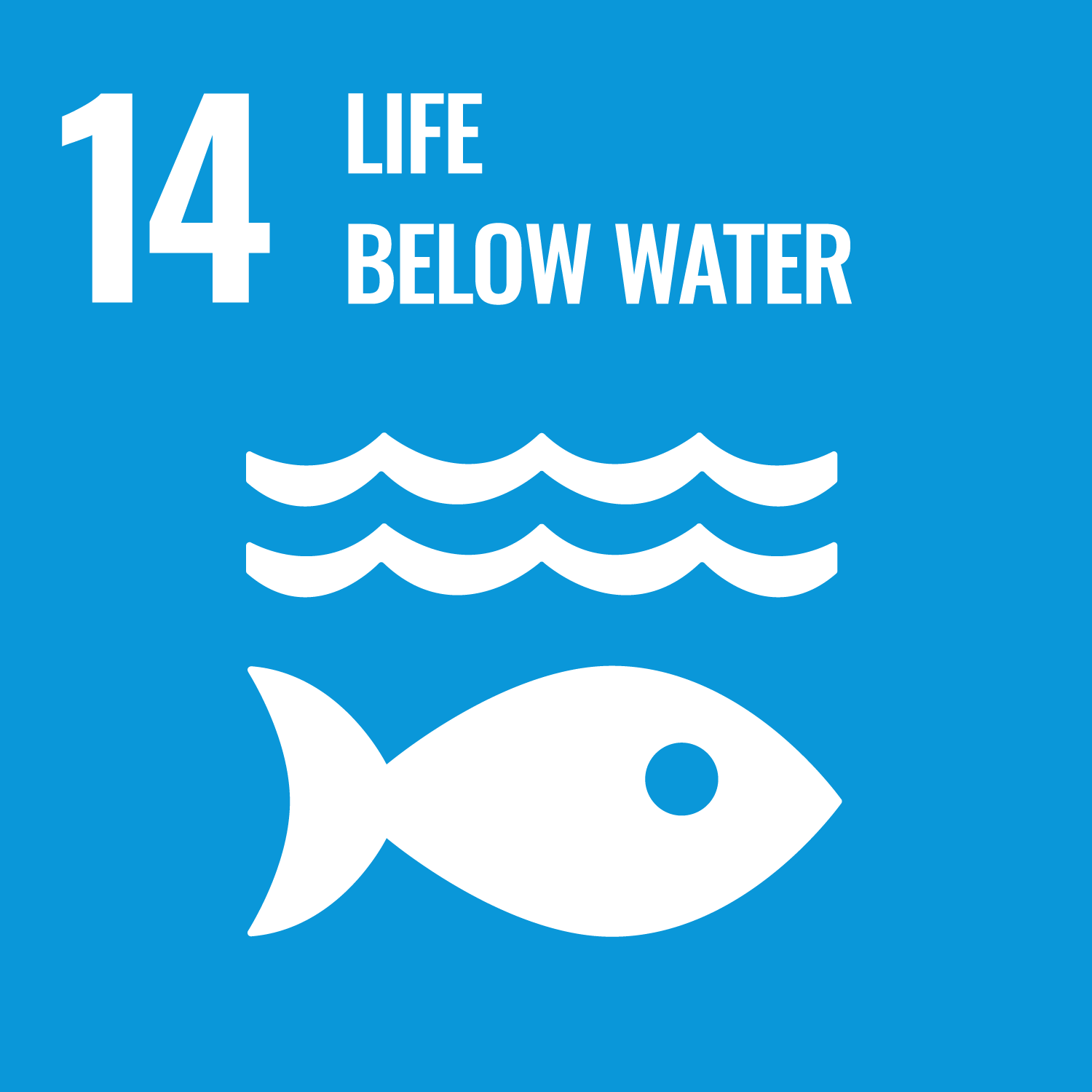
Life Below Water
Action for Agriculture works with students to understand where their food comes from and how to work sustainably with producers. With the Great Barrier Reef off our Queensland coast and our natural beauty, our programs educate students to understand the effects of marine pollution and the risks of unsustainable farming practices. Students are empowered to ask questions, challenge their thinking and discover how they can help to be part of the solution.
Relevant Targets [UNSDG 14.1, 14.4]
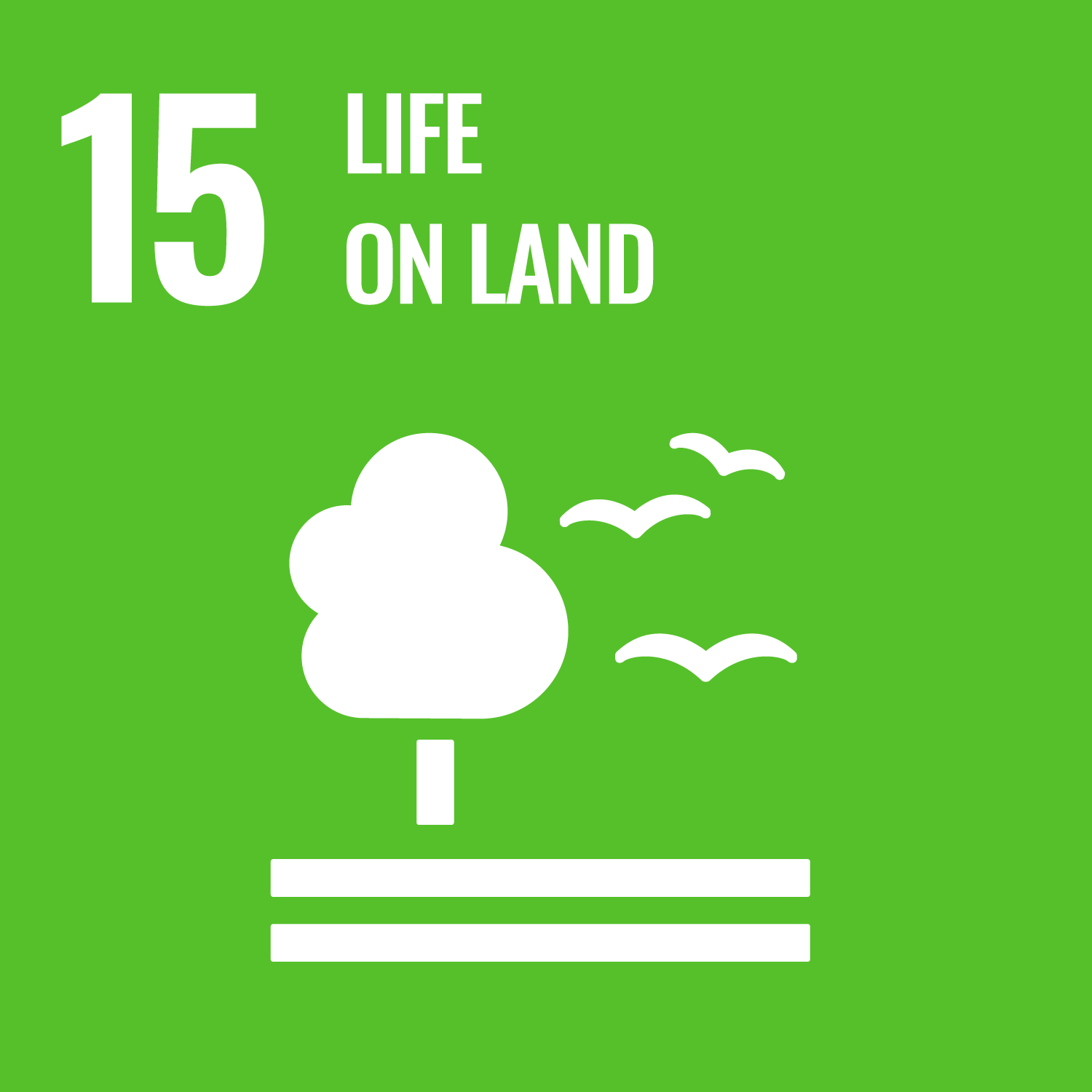
Life on Land
Australian farmers look after 60% of the landscape and are responsible for how it is maintained. In such a large country, only 6% of our land is suitable for growing crops, fruits and vegetables so with a growing global population this presents challenges. Students are encouraged to research ‘Food Security’ as it pertains to our ability to produce, distribute and feed our population and our neighbours through Kreative Koalas and The Archibull Prize. Professional agronomists with expertise in healthy soil management as part of our Young Farming Champion cohort, support the students in their learning and exploration of topics that are vital for regional communities.
Relevant Targets [UNSDG 15.3, 15.5, 15.6, 15.8, 15.9]
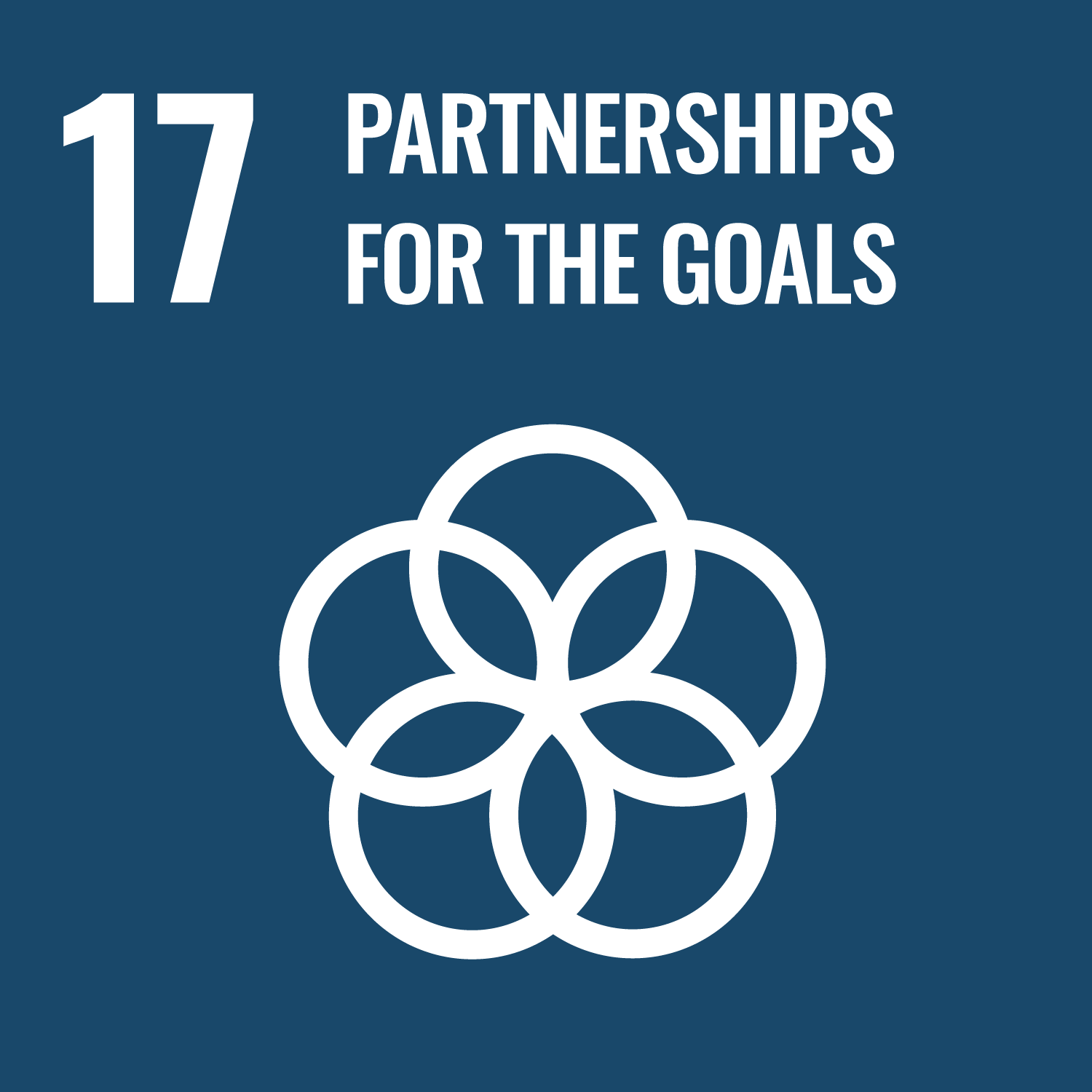
Partnerships for the Goals
Action for Agriculture brings together local and state government, philanthropists, corporate and industry partners to support our work in running Young Farming Champions, The Archibull Prize, Kreative Koalas and the Youth Voices Leadership Team. These multi-stakeholder partnerships share knowledge across industries, expertise across Australia and support us in-kind and financially in our pursuit of closing the gap on the United Nations Sustainable Development Goals. Prizes are also awarded to students in all competitions to encourage and reward their involvement.
Relevant Targets [UNSDG 17.16]
Case Studies

Target 4.7 by 2030 ensure all learners acquire knowledge and skills needed to promote sustainable development, including among others through education for sustainable development and sustainable lifestyles, human rights, gender equality, promotion of a culture of peace and non-violence, global citizenship, and appreciation of cultural diversity and of culture’s contribution to sustainable development.
The Archibull Prize Case-Study: Embedding Agriculture in the Geography Curriculum.

Meet Lorraine Chaffer former president of the geography teachers association ( NSW & ACT) who shares her passion for promoting geography as a subject that integrates issues related to agriculture and the underlying science that sustainable agriculture and food security depend on.
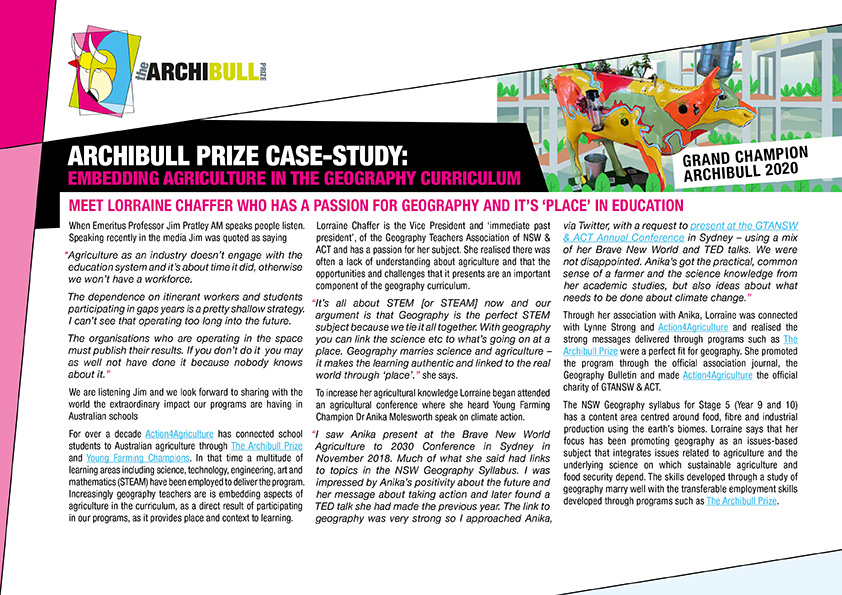
- Lorraine’s realisation that there is a lack of understanding about agriculture, its opportunities and challenges inspired her to increase her knowledge by attending conventions, which prompted connections to Young Farming Champion, Dr Anika Molesworth and then Lynne Strong of Action4Agriculture.
- Fuelled by these connections, Lorraine is now a champion of The Archibull Prize program and its integration for Geography, “It’s all about STEM [or STEAM] now, and our argument is that Geography is the perfect STEM subject because we tie it all together. With geography, you can link science to what’s going on at a place. Geography marries science and agriculture – it makes the learning authentic and linked to the real world through ‘place’.”
Meet Amy Gill, a teacher with youth off the streets and a passionate advocate for the role agriculture plays in teaching disadvantaged kids.
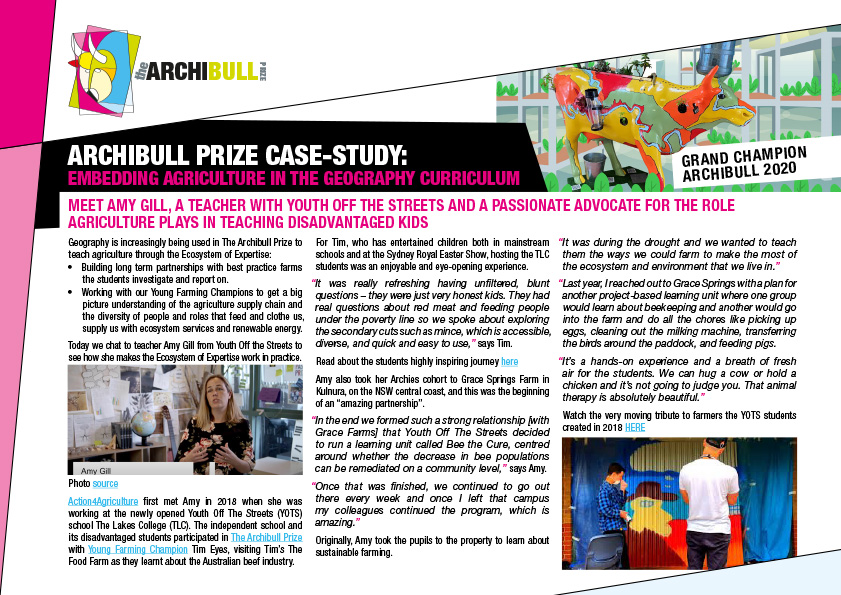
- Action4Agriculture first met Amy Gill in 2018 through the newly opened Youth Off The Streets (YOTS) school, The Lakes College (TLC), whose disadvantaged students participated in The Archibull Prize and were positively impacted by the Ecosystem of Expertise that Amy tapped into during their program participation.
- With Young Farming Champion Tim Eyes at his ‘The Food Farm’, the students learned about the Australian Beef Industry, had honest conversations about red meat, and discussed the importance of feeding people in poverty.
- Amy also formed the beginnings of an “amazing partnership” with the School and Grace Springs Farm in NSW, where the students initially went to discuss ecosystems and the environment, and ended up inspiring a whole learning unit called Bee the Cure; centred around the remediation of the declining bee populations.
- All the explicit based learning experiences supported by Archibull program connections through an Ecosystem of Expertise have inspired the students from the School to see the link between geography and science and even consider careers in agriculture.
Meet Ray Howells, geography teacher at Pymble Ladies’ College, who has integrated ‘ecosystem of expertise’ into the stage 5 geography program.
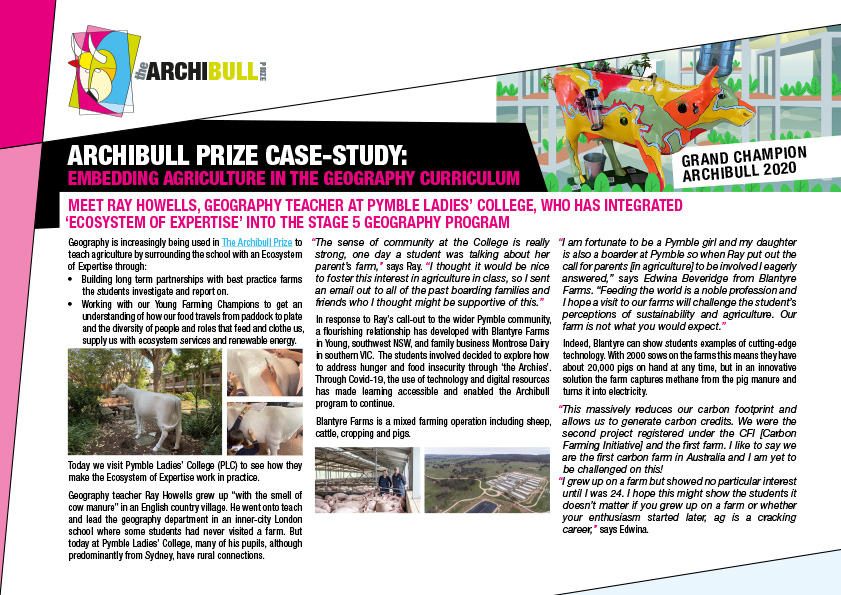
- Pymble Ladies’ College Geography teacher Ray Howells began his own local Ecosystem of Expertise by sending an email call-out to the wider Pymble community to foster student interest in agriculture through local support with The Archibull Prize, which has prompted a flourishing relationship with Blantyre Farms in Young, southwest NSW, and family business Montrose Dairy in southern VIC.
- Blantyre Farms is a mixed farming operation including sheep, cattle, cropping and pigs run by Edwina Beveridge, a Pymble Alumna, who is eager to show students examples of cutting-edge technology in the name of “challenging the student’s perceptions of sustainability and agriculture”.
- Montrose Dairy’s Gillian Hayman (also an ex-PLC Alumna) responded to Ray’s email to help students see through explicit based learning that, “There are so many exciting career opportunities across all aspects of agriculture. [..] Even if people do not choose a career in ag, it’s so important to understand food production and land management as a consumer.”
Archibull Prize + Kreative Koalas Case-Study: Want to Drive Change – Who do You Think Should be the Messenger?

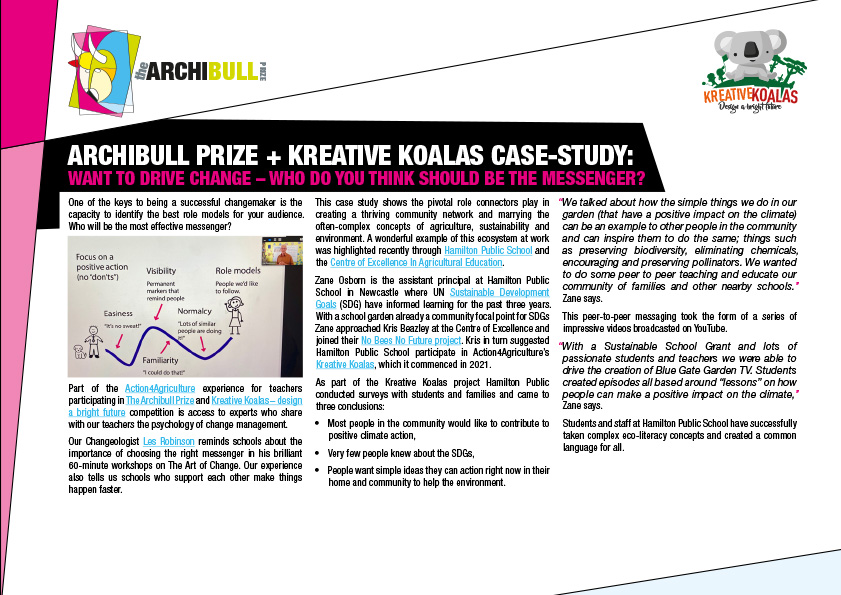
- Action4Agriculture’s experience tells us that schools who support each other make things happen faster, as highlighted recently by Hamilton Public School and the Centre of Excellence In Agricultural Education who connected on the latter’s No Bees No Future project, which prompted the former to participate in the Kreative Koala’s program in 2021.
- Working successfully together with agricultural connectors and participating in programs such as Kreative Koalas and The Archibull Prize has increased eco-literacy within communities surrounding the two co-collaborating schools, celebrated by Blue Gate Garden TV and a suite of new shared educational resources.
- Both Hamilton Public School and the Centre of Excellence in Agricultural Education have also been recognised as finalists in the NSW Banksia Awards Minister’s Young Climate Champion category.
Kreative Koalas Case Study: Hill Top Public School uses Kreative Koalas as a Catalyst to Report on Education for Sustainability.

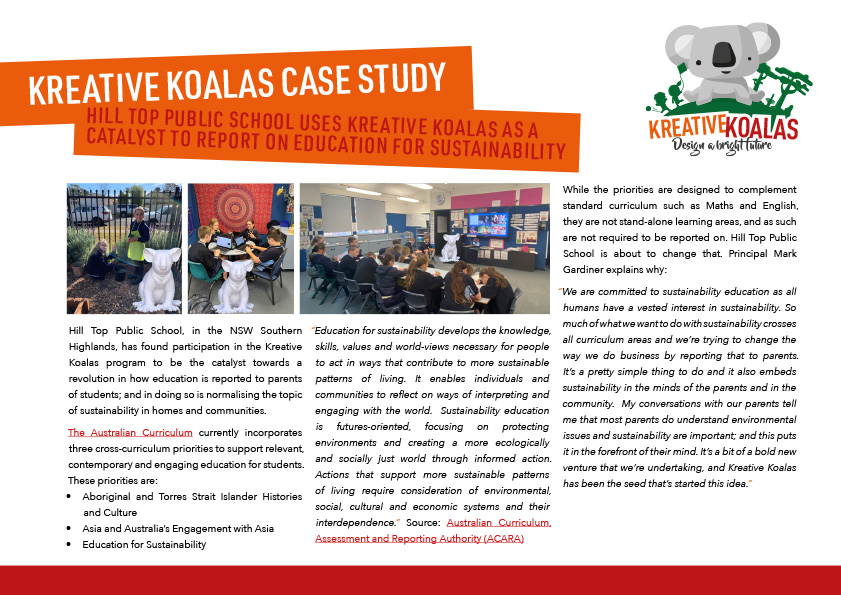
- Hill Top Public School in the NSW Southern Highlands has revolutionised how it reports to parents on students’ education while actively normalising the topic of sustainability in homes and communities to take the local community along with them on their sustainability journey.
- Principal Mark Gardiner explains, “We are committed to sustainability education as all humans have a vested interest in sustainability. So much of what we want to do with sustainability crosses all curriculum areas, and we’re trying to change the way we do business by reporting that to parents.”
- Hill Top students and teachers have connected with a range of community and business initiatives through their Kreative Koala experience; learning about carbon sequestration and its impact on sustainability from Climate Friendly; forming a relationship with the local Indigenous community to develop an understanding of ancient fire-practice habits and native food gardens for their school kitchen; engaging with the arts and science departments at Bowral High School; and getting involved with a sustainability project with Wingecarribee Council.
Kreative Koalas Case Study: Gerringong Public School Winning The War on Waste

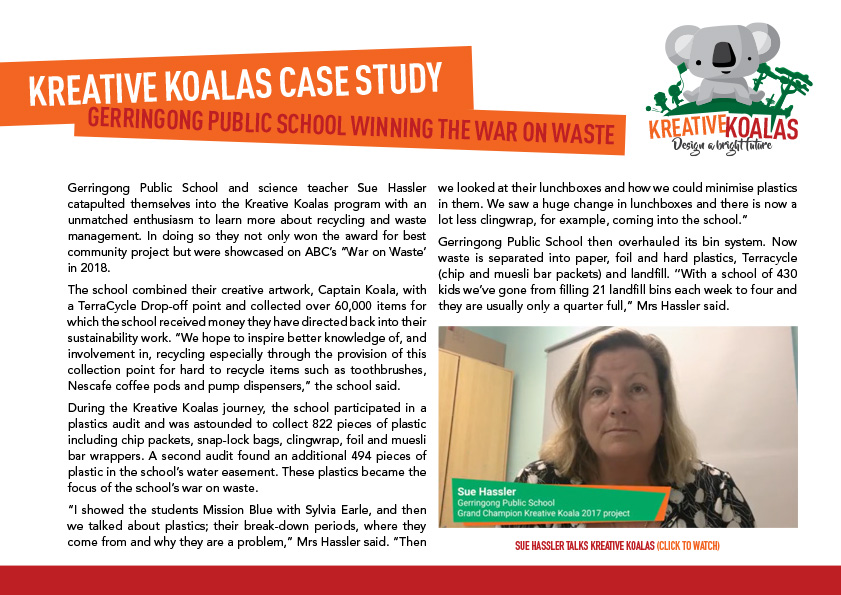
- Gerringong Public School and science teacher Sue Hassler took their participation in the Kreative Koala’s program to a whole new level of distinction, winning an award for best community project and being showcased on ABC’s “War on Waste’ in 2018 for its incredible war on plastics initiatives.
- During the Kreative Koalas journey, the School participated in two plastics audits, which astounded them and inspired the entire School to overhaul its waste management system, separating out all paper, foil and hard plastics, Terracycle, and landfill products going so far as to become a local community TerraCycle facility.
- Not content to work in isolation, Gerringong Public School extended its KK initiatives to include and build recycling and better waste management awareness in the local community. Furthermore, Sue Hassler, in her role as KK Ambassador, brought in six other local primary and secondary schools to create the Kiama Community of Schools (KCoS) and extend their fantastic work with the program further.
Young Farming Champion Case-Study: Tayla Field and The Archibull Prize
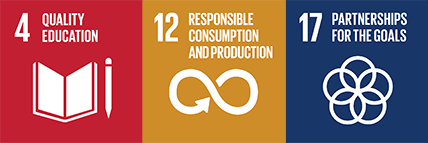
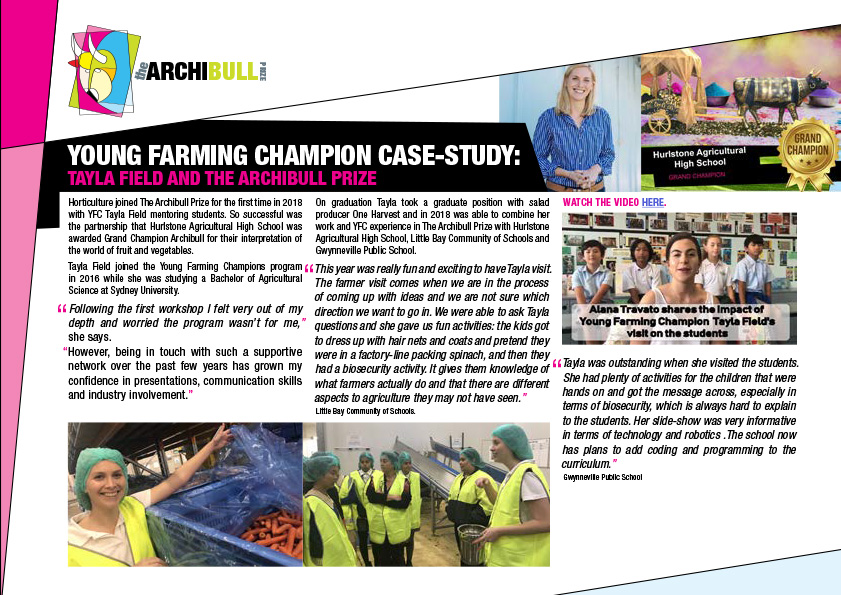
- Horticulture’s Young Farming Champion Tayla Field combined her industry involvement with producer One Harvest and YFC experience in The Archibull Prize with Hurlstone Agricultural High School, Little Bay Community of Schools and Gwynneville Public School to immerse the students in the world of agriculture.
- Sharing her love of horticulture and agriculture with a new generation through engaging activities, Tayla’s mentoring role gave the students hands on insights into biosecurity, robotics, a greater understanding of what farmers actually do, and better awareness of the multifaceted aspect of agriculture to create a really eye-opening experience for all involved.
- Tayla’s mentor role and partnership with Hurlstone Agricultural High School was so successful the School was awarded Grand Champion Archibull in 2018 for their interpretation of the world of fruit and vegetables.
Young Farming Champion Case-Study: Emma Ayliffe, The Archibull Prize and Parramatta Public School.
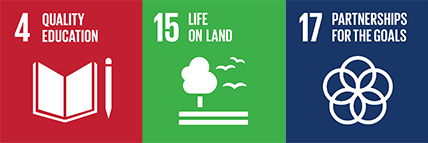
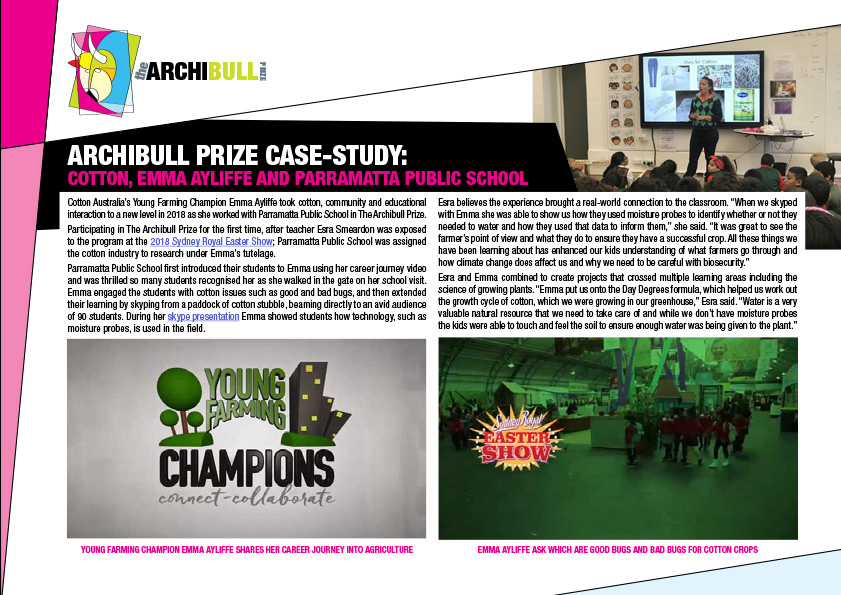
- Young Farming Champion Emma Ayliffe introduced Parramatta Public School students to the cotton industry through digital means when the School was assigned to Emma’s expertise as part of its first participation in The Archibull Prize coordinated by Parramatta teacher, Esra Smeardon.
- Introduced to the Young Farming Champion via her career journey video, Emma visited the school in person and followed this up this through an engaging and interactive Skype presentation where she demonstrated a farmer’s perspective of growing cotton crops and how they use technology to overcome agricultural issues.
- Along with building an understanding of the growth cycle of cotton and what is required to grow a successful crop (which the School is actively growing in its own greenhouse), working with Emma and Esra through the Archibull program helped demystify the students’ understanding of farming and agricultural misconceptions especially surrounding the type of careers in the industry; namely that it’s not necessarily a labour intensive career path and that scientists and agronomists vocations are also available.
Young Farming Champions
In 2019 our Young Farming Champions travelled over 24,000 kilometres to visit schools participating in The Archibull Prize. That’s the equivalent of travelling half-way around the equator. They volunteered over 2650 hours to share their love of agriculture and inspire other young people to follow their career journey.
